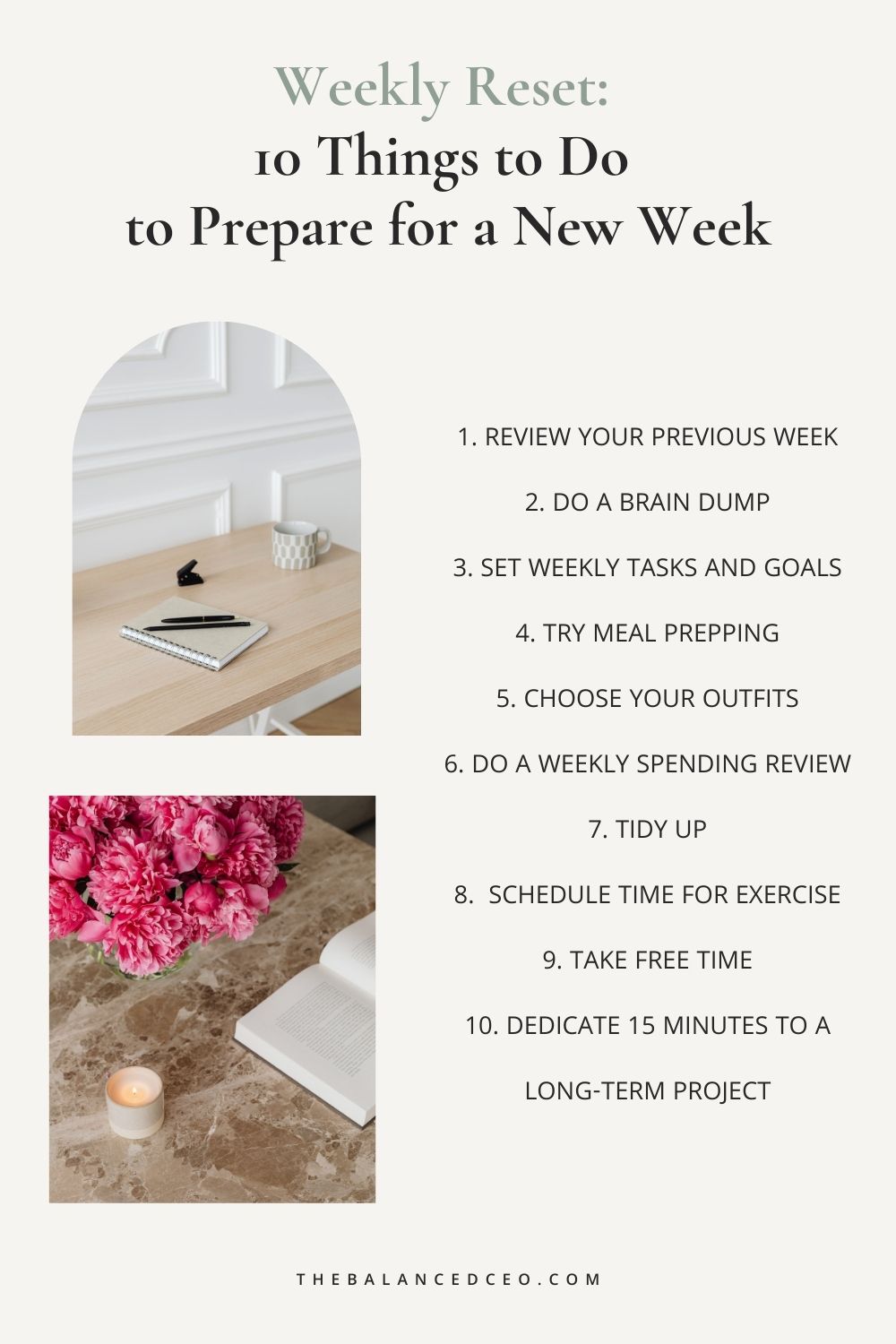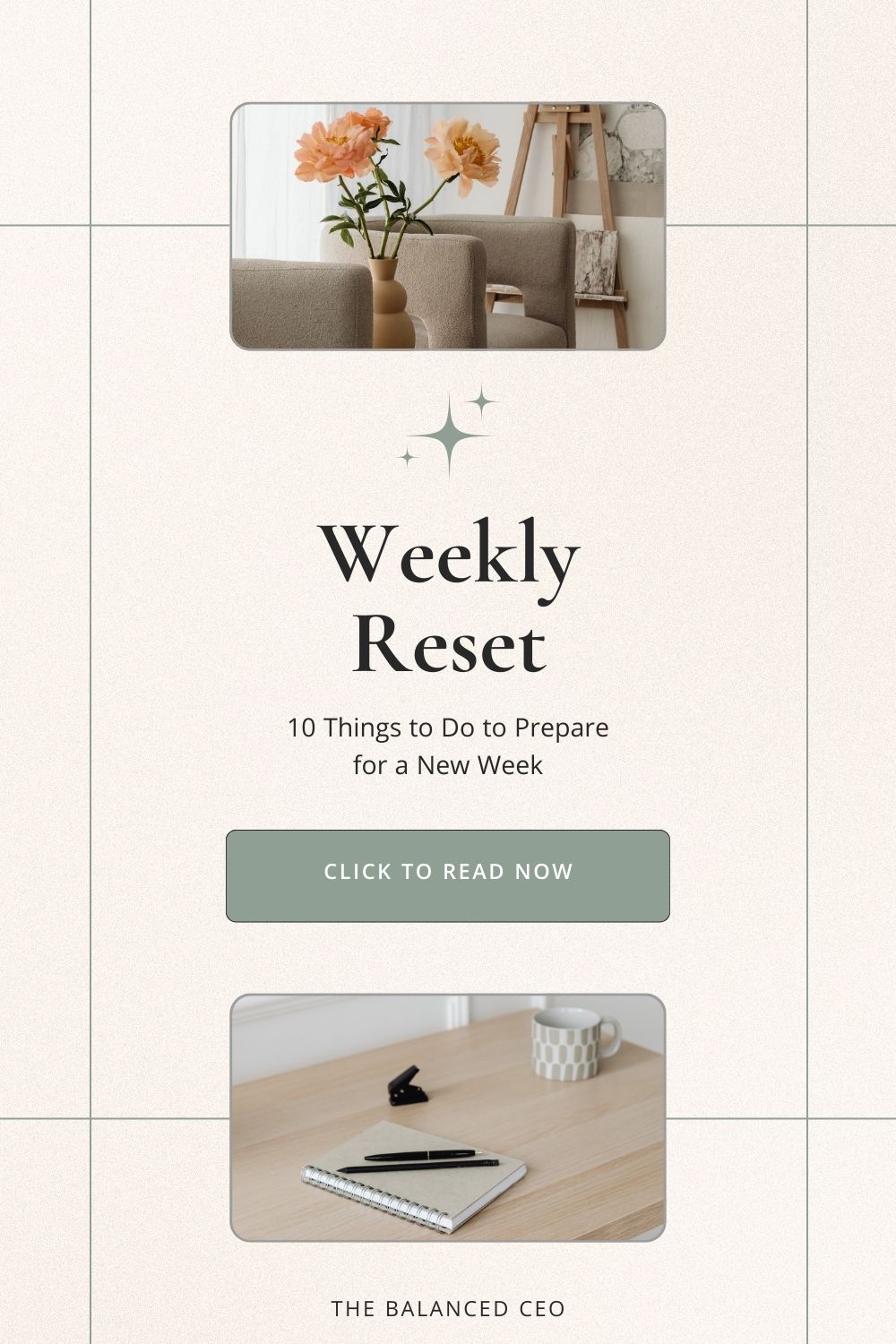This post may contain affiliate links, which means I’ll receive a commission if you purchase through my links, at no extra cost to you. Please read full disclosure for more information.

Weekends are for relaxation, yet many people experience stress because of the upcoming week. If you’re tired of feeling unprepared every time you face the day, this comprehensive list of ideas for your weekly routine might just be what you need to approach the new week confidently.
What’s a Weekly Reset?
A weekly reset is a list of tasks that help you prepare you for the coming week. It usually involves planning, reflecting, journaling, and mental cleaning. Doing one also lets you pause and clear your mind of yesterday’s thoughts.
The routine can include anything to help you feel prepared for the following week, from an elaborate activity to a 10-minute Sunday evening practice. What makes this time unique is it enables you to keep track of your progress and helps you become accountable for your actions.
10 Simple Ideas for a Weekly Reset Plan
Don’t know where to start? Consider the following simple yet effective activities during weekends.
1. Review Your Previous Week
The first thing to do is look back on the previous week. How are you doing in that online course you started last week? Was your major presentation successful? Take note of your achievements — both big and small — challenges and main takeaways from your experience. You can also take this time to review your progress toward long-term goals and projects.
2. Do a Brain Dump
Clear your mind from the clutter before diving into planning. On a sheet of paper, write lingering thoughts and tasks you’ve put on the back burner, like fixing your closet or scheduling a dental appointment. Afterward, assess your writings and sort them based on priority.
3. Set Weekly Tasks and Goals
Break those priorities into simpler steps to make them manageable. Doing so can also help you build confidence in your capabilities and form positive habits. For example, list items to buy if shopping is a priority for the coming week. Here’s a quick guide to make planning more manageable:
- Front load unfinished business from the previous week to ensure you’re hitting deadlines.
- Block out time for scheduled appointments and events, such as work and celebrations.
- Add in recurring maintenance tasks concerning your job and house.
- List what progress you want to see at the end of the week.
- Include low-priority tasks you can do if you finish everything else on the list.
You can also make your plans actionable by adding a time estimate for each task.
4. Try Meal Prepping
If you’re working from home, you’ll understand the hassle of not having enough time to cook breakfast or lunch. This is where meal prepping comes in — it helps eliminate the need to spend minutes cooking a decent meal. Here are some healthy meal prep ideas to add to your routine:
- Kale breakfast salad: These leafy greens contain phytonutrients that help prevent acne and boost the immune system. This hearty breakfast is best for early birds or those always on the go.
- Fresh Rolls: Assemble these nutritious snacks in advance so you’ll have something to munch on during hectic workdays.
- Overnight oats: Fill jars with rolled oats, milk, chia seeds and your favorite fruits. Let them soak overnight and enjoy them for the rest of the week.
5. Choose Your Outfits
If you spend considerable time choosing what to wear in the morning, consider planning your attire for the whole week. Prepping your outfits in advance means you can set your alarm a little later because you don’t have to sift through your closet again.
Start with the basics, like dresses, skirts, pants and tops. When choosing your pieces, ensure they’re cohesive in style, pattern, and color. Accessorize and select pairs of shoes that match the outfits.
6. Do a Weekly Spending Review
This approach includes monitoring your financial activities from the previous week and budgeting for the coming days. Doing a weekly spending review is essential, especially if you’re struggling with setting aside money. The average savings for 30-year-olds is around $11,000, with the median only at $3,240. By checking up on your account weekly, you can monitor how much unnecessary spending you do and how much more you should be putting into your savings.
If you’re in your 20s and 30s, staying loyal to your financial goals is crucial if you aim to start saving for retirement, a house or emergency funds. No matter your goal, you can ensure you’re still on track when you record your expenses, find ways to cut spending and stay within your weekly budget.
7. Dedicate 15 Minutes to a Long-Term Project
Are you trying to play an instrument, crochet a jacket, or paint a masterpiece? Work and life demands can quickly derail you from completing a long-term task, which can be overwhelming. However, when you consistently spend 15 minutes a day, you cultivate momentum and consistency, making a daunting activity feel more achievable.

8. Schedule Time for Exercise
Every adult needs at least 150 minutes of moderate aerobic exercise weekly to achieve a healthy lifestyle. While this may sound overwhelming, you can break it into smaller sessions. For instance, plan a 30-minute morning walk for five days or a daily 20-minute yoga session before bed.
9. Tidy Up
Think about how often you scrub your refrigerator, closet, and pantry. If things are looking a little rough, plan some time for cleaning and organizing the house as you start a new week. You can begin the clean-up session on Sunday and proceed with low-priority areas when you have spare time in the morning or after work.
10. Take Free Time
Finding time for relaxation has become more challenging in the hustle and bustle of daily life. The demands of work and housework can lead to burnout if you fail to rest properly, so making a schedule for downtime activities like reading a book, meditating, catching up on sleep, or doing something you love is essential. Remember to learn to say “no” except for essential requests that may come your way — you’ll never have any free time otherwise.
Plan for the Week Ahead
There’s no better feeling than knowing you’re ready to face the week ahead. With this 10-step weekly reset routine, you can ensure balance between work, life, and leisure. After practicing, remember to pat yourself on the back for doing a great job.

Cora Gold
Contributor
Cora Gold is the Editor-in-Chief of Revivalist magazine, a publication dedicated to happy, healthy, and mindful living.







Leave a Reply